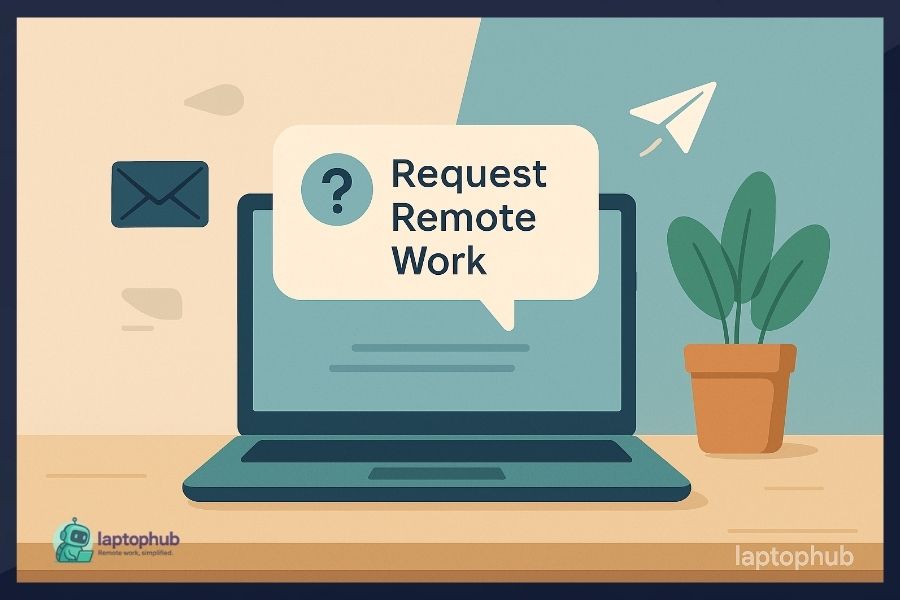Remote work is here to stay, but not every company has fully embraced it. If you want to make the shift, knowing how to ask your boss to work remotely—without raising red flags—is key. Whether you’re aiming for one day a week or full-time remote, the way you pitch it makes all the difference.
This guide breaks down how to approach the conversation strategically, address your manager’s concerns, and set yourself up for a smooth “yes.”
💡Key takeaways:
- Understand your motivations and company culture before requesting remote work.
- Build a clear, results-oriented proposal that addresses your boss’s concerns.
- Emphasize productivity, accountability, and communication readiness.
- Be flexible—suggest a trial period and prepare to revisit the conversation if needed.
Why Do You Want to Work Remotely?
Start with your motivation—but keep it grounded in work. Your personal comfort matters, but your employer wants to hear how remote work helps the business.
Common valid reasons:
- Fewer distractions = more focused work
- No commute = more time and energy for deep tasks
- Flexibility = better work-life balance = less burnout
- Comfort = higher job satisfaction = more retention
Before you even bring it up, be honest with yourself: Can you thrive outside the office? Will you stay accountable? If the answer is yes, you’re already halfway there.
Understand Your Company’s Remote Work Culture
Don’t blindly ask for something your company already has a policy on. Check internal docs or HR materials to see what’s allowed.
If remote work is already offered (even partially), refer to it. That way, you’re not introducing a radical idea—you’re asking to align with company practices.
If your company doesn’t have a remote policy, you’ll need to be more proactive. That means showing you’ve thought through the logistics and benefits in detail.
Build a Strong Case Before You Ask
Think of your request like a pitch. You’re asking for a change in the way you work—possibly long-term. So prepare the same way you would for a big meeting.
Your proposal should cover:
- Your reason for wanting to work remotely
- How your work will stay on track or improve
- How you’ll stay in touch with your team
- The tools you’ll use for communication and task management
- A proposed schedule (e.g. two days remote, three in-office)
- How performance will be measured
Anticipate any question your boss might have—and answer it before they ask.
Emphasize Productivity and Accountability
Your manager wants results, not just reassurances. So give specific examples of how remote work can help you get more done.
✅Say this:
“When I work from home, I have fewer interruptions and can get into deep focus mode. I typically complete high-priority tasks faster compared to in-office days.”
❌Not this:
“I just prefer being at home.”
If you’ve already worked remotely before (during COVID or otherwise), share data.
“During Q2 2023, when I worked remotely three days a week, I hit my project goals 25% ahead of schedule.”
That’s the kind of statement that builds trust.
Suggest a Trial Period
This is one of the most effective ways to ease any hesitation. A short test period gives both sides a chance to evaluate without long-term commitment.
Example:
“I’d like to try working remotely on Mondays and Fridays for 30 days. If performance slips or communication becomes an issue, I’m fully open to adjusting.”
This approach shows flexibility and removes pressure from your manager’s decision.
Show That You’re Tech-Ready
Remote work only works if you can stay connected and organized. Your boss needs to know you’ve got the tools—and the discipline—to stay productive outside the office.
Make sure you’re proficient in tools like:
- Slack, Microsoft Teams – for real-time communication
- Zoom, Google Meet – for virtual meetings
- Asana, Trello, Notion, or ClickUp – for task management
- Google Drive, Dropbox, or cloud storage – for file sharing
- Time-blocking apps – to stay accountable
If needed, offer to do a short tech-readiness walkthrough. It shows initiative.
🖥️Also read: Best Remote Work Tools 2025: What Smart Teams Are Using Now
Time It Right
Don’t spring this request out of the blue—especially not during peak stress. Ideal times to ask:
- After you’ve successfully led or completed a project
- During a regular check-in or one-on-one
- Right before performance review cycles
- When the company is discussing workflows or budget
Bring it up professionally and with purpose. Don’t make it casual small talk.
Address Common Manager Concerns (Before They’re Asked)
Most bosses worry about:
- Losing visibility into your daily work
- Reduced collaboration
- Lower accountability
- Team dynamics being disrupted
Counter these concerns upfront.
Example talking points:
- “I’ll send a quick check-in each morning outlining priorities.”
- “All meetings will still be attended virtually with my camera on.”
- “I’ll track tasks publicly in [tool] so you’ll always see where things stand.”
Make your manager’s life easier, not harder.
Add Social Proof and Precedents
If others in your team or department already work remotely, use that as context.
“I noticed that [Name] on the marketing team has a hybrid schedule. I’d love to try something similar and would be happy to follow the same communication structure.”
You can also cite industry stats:
- 77% of remote workers say they’re more productive at home (source: Owl Labs)
- Remote employees work an average of 1.4 more days per month than in-office workers
These aren’t just facts—they’re reassurance.
Follow Up in Writing
After your conversation, follow up with a short, professional email summarizing what you discussed. This keeps things clear and gives your boss something to reference.
Sample follow-up email:
Hi [Manager’s Name],
Thanks for taking the time to discuss my remote work request today. As mentioned, I’d like to start with a trial period of two remote days per week, beginning next Monday. I’ll continue to meet all deadlines, attend meetings, and stay connected via Slack and Zoom.
I’ll send you a progress update at the end of the first two weeks so we can evaluate how it’s going.
Please let me know if you have any further questions.
Best,
[Your Name]
Build Trust First
None of this works if your performance hasn’t been solid. Remote work is often seen as a reward for self-starters and independent workers.
So before you ask:
- Show reliability
- Be proactive in communication
- Deliver results consistently
- Be the person your manager can count on—even without supervision
What If They Say No?
It happens. If your request is denied, don’t shut down. Ask for feedback.
- “Is there a specific concern I can address to revisit this later?”
- “Can we set a performance goal I need to meet before reconsidering remote options?”
This keeps the door open. Show that you’re coachable and committed to doing what’s best for the team.
FAQs
Is it unprofessional to ask to work remotely?
No. If your request is based on productivity and supported by a clear plan, it’s both professional and forward-thinking.
What if my boss says no to working remotely?
Ask for feedback, address concerns, and propose a trial period or performance goals for reconsideration.
Should I ask in writing or in person?
Start the conversation in person (or over video), then follow up in writing to confirm details and show professionalism.
How do I know if remote work is right for me?
If you’re self-motivated, organized, and can stay accountable without direct supervision, you’re likely a good candidate.
What should I include in a remote work proposal?
Cover your reasons, your schedule, communication plan, productivity tracking, and how you’ll stay aligned with your team.
Final Thoughts
Asking to work remotely isn’t just about making your life easier—it’s about demonstrating that you can thrive without being in the office. Focus on how your work will improve, how you’ll stay accountable, and how your performance won’t drop.
Keep it professional, clear, and solution-oriented. If you handle it the right way, there’s a good chance your boss will be open to the idea.





